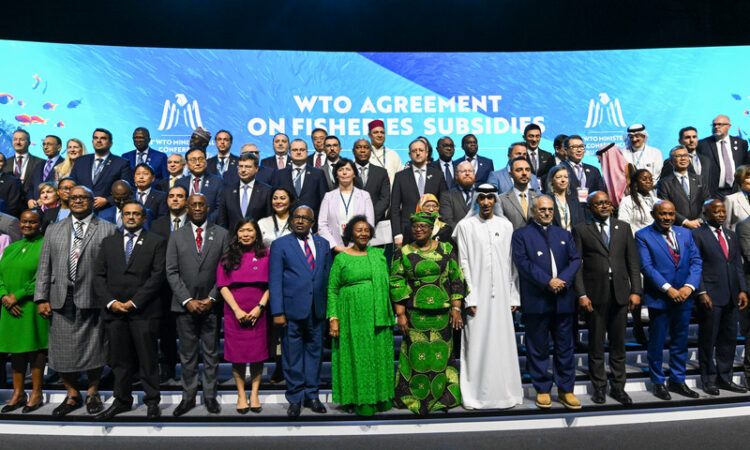
India raised its first formal complaints about the EU’s suite of new environmental laws on Monday (26 February), warning against protectionism in the name of environmental protection.
Speaking on the first day of the World Trade Organisation ministerial conference in Abu Dhabi, India’s commerce minister, Sunil Barhthwal said that he had “serious concerns regarding the increasing use of trade protectionist unilateral measures, which are sought to be justified in the guise of environmental protection”.
Officials say that the remarks are primarily aimed at the EU’s Carbon Border Adjustment Mechanism (CBAM), a carbon levy which will apply initially to imports of aluminium, cement, electricity, fertilisers, hydrogen, iron and steel, unless the products come from regions with similar laws on emissions to the EU.
India and South Africa have led the international opposition to the introduction of the CBAM, which was passed into law by EU lawmakers last year, arguing it could breach the WTO’s non-discrimination principle.
The CBAM levy will start to be applied to imports to the EU from January 2026.
“Many African officials see these new regulations as another layer of protectionism which will cut their access to markets in industrialised economies,” says Carlos Lopes, a former African Union adviser who chairs the African Climate Foundation (ACF).
At the week-long ministerial conference, the WTO’s highest forum and which brings together government ministers from across the world every two years, developing countries are also expected to raise objections about the economic and social impacts of other EU laws. These include the bloc’s new regulation on deforestation, which will require companies to prove across their supply chains that any of their products involving commodities such as timber, cocoa, coffee and rubber have not resulted in deforestation.
“Any climate-justified measures [such as levies] that directly restrict market access by developing countries and LDCs (Less Developed Countries), where research shows the reduction of carbon emissions is minimal, should be avoided,” the African Group at the WTO has said.
For their part, EU officials insist that the phase-out of free allowances for carbon emissions to EU firms means that it is WTO compliant. They have also played down the suggestion that CBAM will cause major disruption to trade flows.
In a study published on Monday, the Asian Development Bank warned that the CBAM would result in only marginal reductions in global carbon emissions while modestly affecting trade flows, particularly in Asia and the Pacific
The ADB’s statistical modeling suggested that CBAM would cut emissions by less than 0.2 percent, alongside a decrease of about 0.4 percent in global exports to the EU and a 1.1 percent reduction in Asia’s exports to the EU.
“The fragmented nature of carbon pricing initiatives in terms of sectors and regions covered, including CBAM, can only partially limit carbon leakage,” said the ADB’s chief economist, Albert Park, in a statement.
“To significantly reduce carbon emissions globally, while also making sure climate efforts are more effective and sustainable, carbon pricing initiatives need to be extended to other regions outside the EU, especially Asia,” he added.
The report further highlights the disproportionate impact of CBAM and the EU’s emissions trading system on Asian subregions, particularly central and west Asia, due to their higher shares of carbon-intensive exports to Europe.
Last year, a study by the the African Climate Foundation estimated that African exports to the EU would drop by four percent due to the CBAM.






